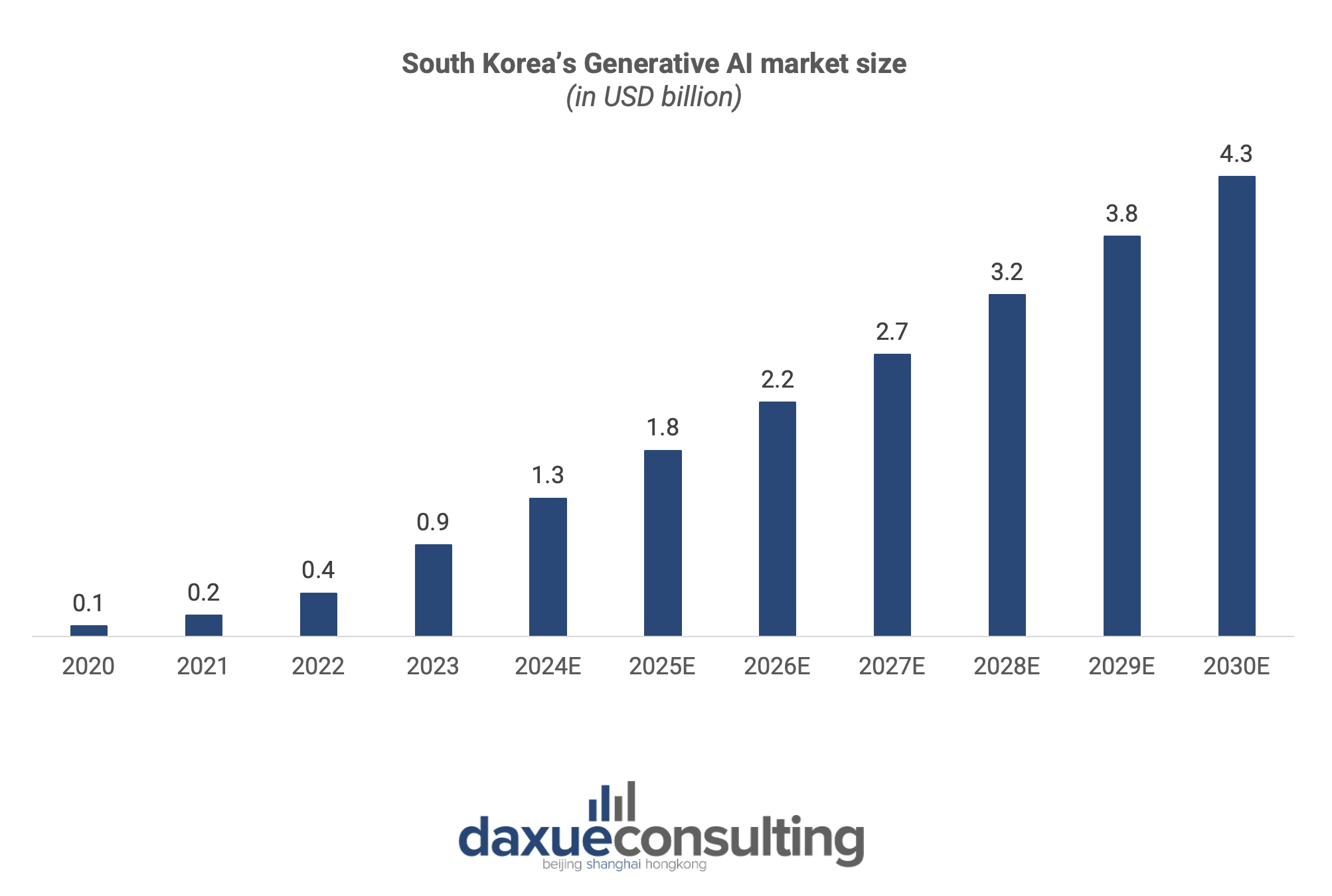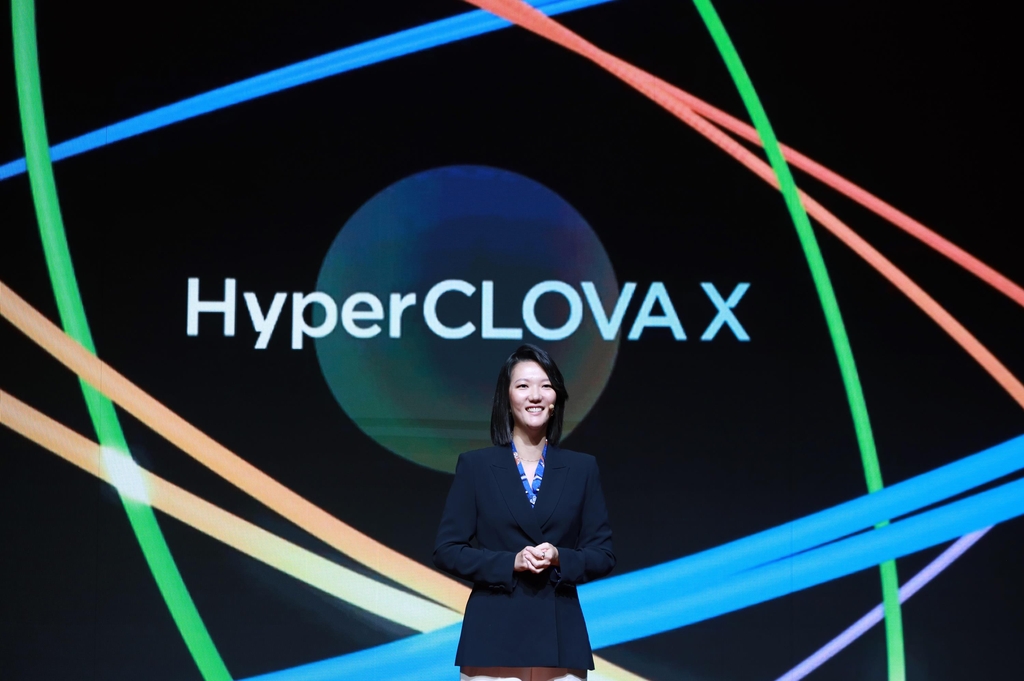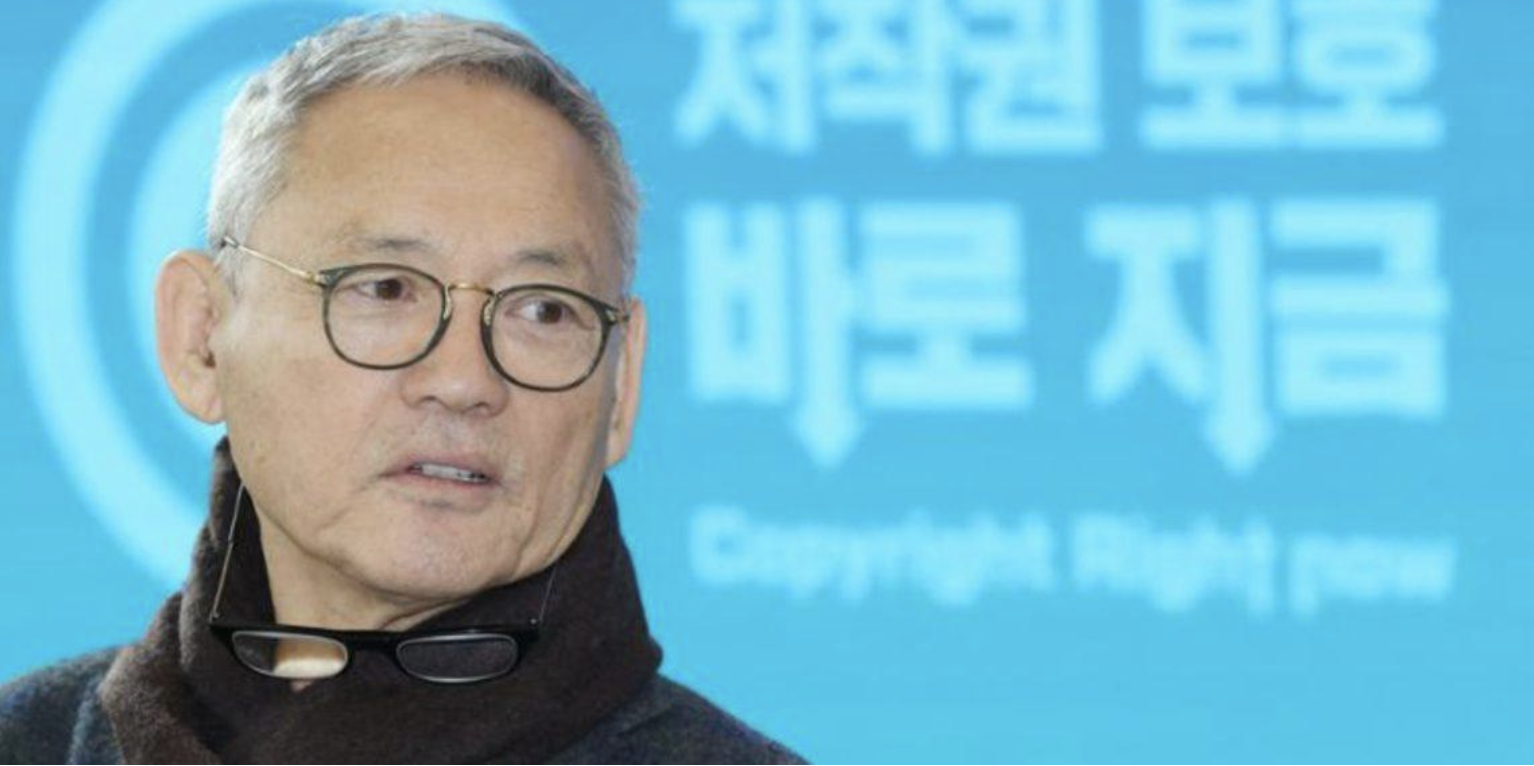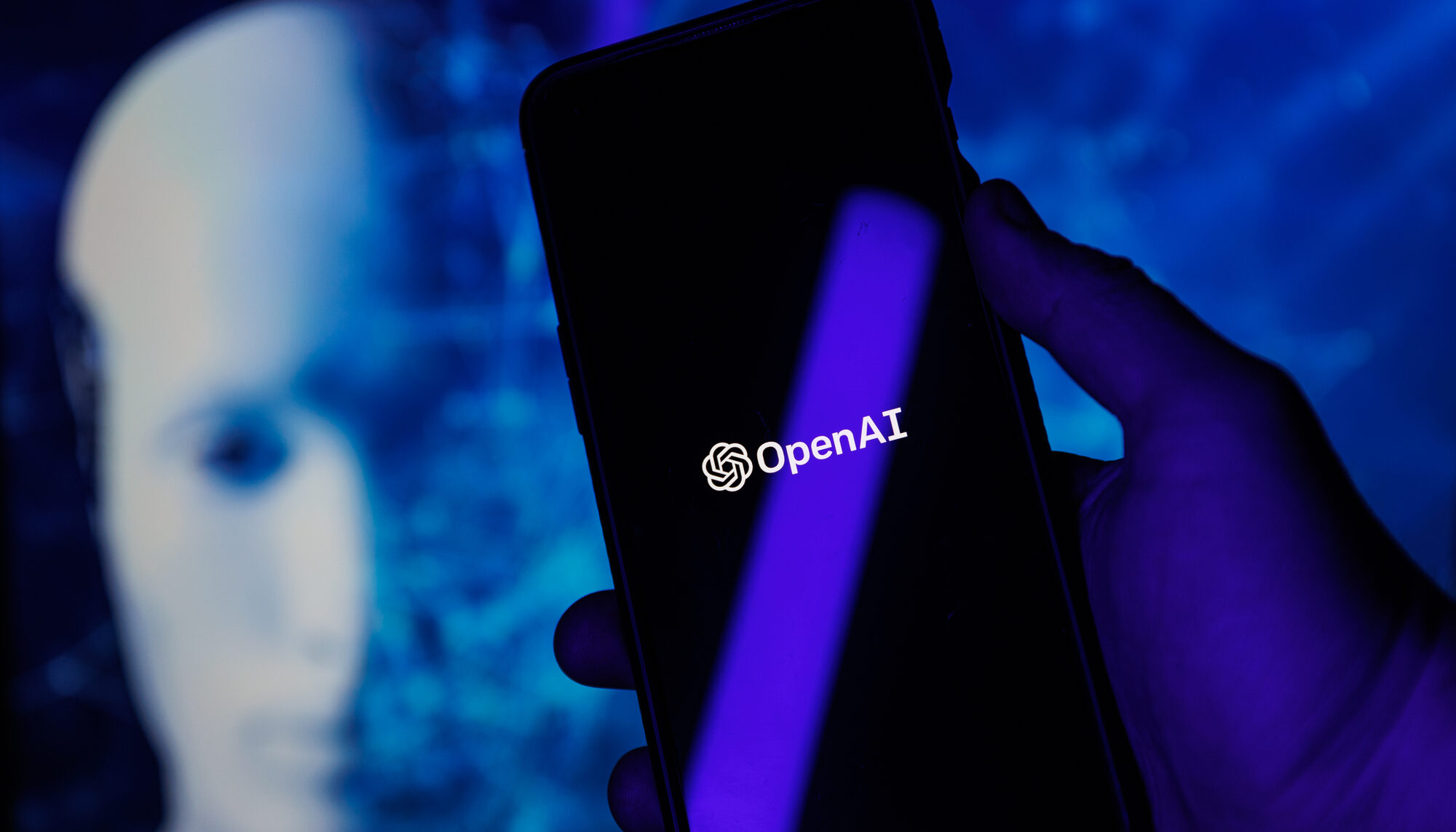Generative AI, especially OpenAI’s ChatGPT, gained remarkable attention in 2023. GPT-4, a high-capacity language model released in March 2023, exceeded USD 1.6 billion in revenue, indicating a lucrative market attracting globa interest. While OpenAI has initially held a strong market presence, other high-tech companies are beginning to enter the AI market.
Read our Korea’s MZ Generation report

In South Korea, the generative AI market is emerging as a promising sector, with companies integrating artificial intelligence into their business strategies. The generative AI market in Korea is projected to reach USD 1.3 billion in 2024, which is significantly smaller than the US’ USD 23.2 billion. By 2030, it is expected to demonstrate an annual growth rate (CAGR) of 22.16%, reaching USD 4.32 billion by 2030, which is still behind the US. However, continuous growth in generative AI development presents opportunities for businesses to innovate, enhance customer experiences, and gain a competitive edge like tech giants Naver and Samsung are doing in Korea.

Where does South Korea fit in the Generative AI landscape?
In early 2023, Naver, Kakao, and other companies spent huge financial resources to develop generative AI technologies. Similar to technology companies that have looked to enter generative AI in China, South Korean firms seek to leverage AI’s adaptability to address local needs. In a relatively short period compared to Chinese companies, Korean firms aspire to make AI more diverse and culturally sensitive, envisioning a competitive, lucrative and inclusive AI landscape.
South Korea has expressed concerns about cultural and linguistic bias in existing English-trained chatbots, emphasizing the dominance of American companies in AI. In response, South Korean firms are adopting localized strategies tailored to Korean consumers, like Naver with CLOVA X. They aim to target niche markets overlooked by US and Chinese companies.
However, other companies such as Samsung have looked to place themselves in Generative AI’s global market, beginning in South Korea. Recently, Samsung introduced Gauss, a generative A.I. model with various uses.
Revolutionizing AI: Naver’s and Samsung’s cutting-edge generative AI models
The two of the biggest players that have driven Generative AI in South Korea are technology giants Naver and Samsung.
Naver’s Clova X: Generative AI-driven searches
Naver, a leading technology company, is dedicated to Generative AI, focusing on Korean consumers and navigation. Their sustained commitment is evident through strategic entries, emphasizing software and hardware advancements.
South Korean internet giant Naver launched its own generative AI tool, HyperCLOVA X, following the trend set by OpenAI’s ChatGPT. HyperCLOVA X aims to provide generative AI-driven searches for users. It includes tools like the CLOVA X chatbot for web search, online shopping, and navigation improvement. Using public data from the South Korean government and Naver’s internet search data, this model was tailored for Korean language speakers. Notably, Clova X distinguishes itself by recognizing Korean idioms and slang, providing a culturally attuned experience, in contrast to American chatbots that struggle with non-English nuances.
To enhance Naver’s search engine, consumers can use the Cue function, a generative AI, alongside Naver’s search engine. Naver initiated beta services for CLOVA X in August 2023 and for Cue in September 2023, showcasing its commitment to rapid development.
Naver is also working on the hardware and infrastructure involved with generative AI as well. It is collaborating with Samsung Electronics to develop smaller and more efficient chip solutions to support AI technology. Additionally, in November 2023, Naver opened a new data center dedicated to HyperCLOVA X services. Positioned as one of the five largest data centers in Asia, this initiative underscores Naver’s steadfast commitment to advancing generative AI.

Galaxy S24 and more: Samsung’s vision for generative AI integration
Samsung boast versatile generative AI models that aimed at global impact despite its recent entry into the field. With flagship smartphones already equipped with on-device AI technology, Samsung is set to become a keystone to both the South Korean and Generative AI market. This enables users to benefit from tasks like sentence summarization without compromising personal information security.
Samsung plans to integrate its generative AI models into various products, with expectations of debuting as early as September 2024. Since their biggest competitor, Apple Inc., lacks generative AI on their devices, Samsung seeks to take the lead in the mobile generative AI market by integrating AI into their new Galaxy S24 devices.
Samsung Gauss is comprised of three sub-models: the first is the Samsung Gauss Language, which is a language model that is Korean-oriented. They also created the Gauss Code and Gauss Image, which are a coding assistant and image generation model, respectively. The model reflects Samsung’s vision to leverage AI for global consumer improvement by drawing from worldwide knowledge.
Generative AI problems: Security, intellectual property, and lawsuits
Despite the economic and technological potential of generative AI in South Korea, initial challenges include issues with intellectual property, regulations, and lawsuits amid increased AI usage.
Legal issues have become an issue for Generative AI. With the leakage of personal data such as credit card details of 687 Korean ChatGPT users in July 2023, there is distrust of security within the public.
Moreover, music and royalty issues surrounding AI-created compositions have surfaced. The Korea Music Copyright Association (KOMCA) discontinued royalty payments for tracks composed by AI-driven music composition software. Similarly, webtoon creators have launched an online boycott in Korea since their works were used as training data for AI-integrated services.
Responding to these issues, the Copyright Commission in Korea is actively developing guidelines to address AI-assisted creations and copyright concerns. The debate surrounding the Text and Data Mining (TDM) exception in copyright laws underscores the need to balance AI companies’ interests with potential disruptions to creative AI. Establishing clear rules for AI copyright is crucial to harmonize the rights of human creators while promoting creative output by AI-driven entities.

Generative AI in South Korea: emerging trends and potential future developments
Despite the numerous challenges and uncertainties, many technological giants of South Korea are actively supporting generative AI’s future. The Samsung AI Forum, for instance, emphasized continuous support for generative AI research and collaboration with leaders to enhance consumer experiences. The forum brings together experts and students to discuss hyperscale AI and next-generation semiconductor research. During the event, Samsung’s CEO, Kyung Kye-hyun, acknowledged the swift emergence of Generative AI as a valuable tool to tackle challenges. Moreover, Kim Dae-hyun, Executive VP of Samsung Research Global AI Center, reaffirmed the company’s steadfast dedication to ongoing generative AI research aimed at maximizing consumer value.
As part of their strategic efforts, South Korea aims to enhance language diversity in AI models to maintain competitiveness in the global arena. Concurrently, there is a mounting demand for research into the safety and sustainability of generative AI. Despite these advancements, however, numerous unresolved issues continue to persist.
South Korea’s potential and challenges in the generative AI market
- South Korea has entered the generative AI market recently, immediately addressing cultural biases concerns.
- Key players in South Korea’s generative AI landscape include Naver and Samsung. Naver launched HyperCLOVA X for generative AI-driven searches, while Samsung introduced Gauss for diverse applications in the Galaxy S24 series.
- Naver focuses on assisting Korean consumers, while Samsung aims to establish itself as a global leader in generative AI by integrating Gauss into its devices.
- Despite technological advancements, South Korea encounters legal challenges related to generative AI usage. Establishing guidelines will be crucial in determining the safe and ethical use of generative AI, protecting both companies and individuals.
- The future of AI holds immense potential, prompting significant investments from companies striving to maintain competitiveness. Emphasizing collaboration of AI resources is vital for accelerating advancements in the generative AI field.





